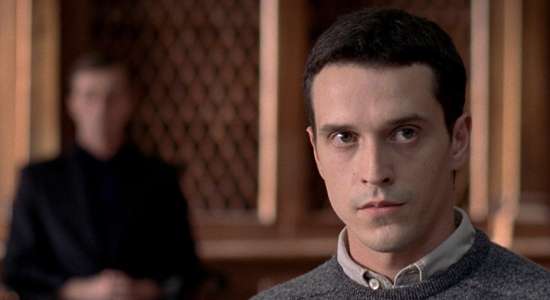 CHRISTO JIVKOV IN IN MEMORY OF METhe elegant corridors of a Jesuit spiritual quest
CHRISTO JIVKOV IN IN MEMORY OF METhe elegant corridors of a Jesuit spiritual questThe world of Saverio Costanzo’s
In Memory of Me (
In memoria di me) is collective, yet interior. This is a beautifully composed, austere film with sparse but significant dialogue. When Andrea (Christo Jivkov) arrives at the big Jesuit monastery (shot entirely at San Giorgio Maggiore near Venice) the Father Superior (Andre Henneke) tells him to report on his fellow novices if they don’t measure up. Mutual public criticism is a regular thing. The uniform is sweaters and slacks. Andrea’s room on a big corridor is minimal, but he has a laptop; there are few of the medieval accoutrements shown in Philip Groning’s documentary about La Grande Chartreuse,
Into Great Silence. This is a low-contact culture. People don’t even say good morning in the communal bathroom. They stare at each other, but hardly interact.
There are many faces, but only five characters: Andrea, the superior, the head teacher or Father Master (Marco Baliani), and two other novices whose doubts dominate the action. Fausto (Fausto Russo Alesi) stumbles badly when it’s his turn to deliver a homily. Andrea spies on him at night, banging his head into a wall and groaning. Later Andrea again spies on Fausto and sees him leaving the monastery at night. At a public criticism session structured by the teacher, various novices give their negative views of Andrea: they think he’s vain, arrogant, over-curious, and judgmental. (They haven’t observed that by getting to know him personally.) Later, when Andrea presents his homily, he’s challenged by the intense, warm Zanna (Filippo Timi). Zanna says what Andrea has written is cold and intellectual: indeed it does seem dry and arrogant, but the phrases are nonetheless striking and well-turned. Andrea defends himself by saying his task as a priest will be to act as an instrument to interpret the Gospel. Zanna retorts that a priest must not analyze, but
embody the Gospel, that he must embody
love. He sees no love in Andrea.
Now Andrea spies on Zanna, and eventually they have an intense discussion in the chapel. Zanna says this is a cold and loveless place and he feels himself dying in here. This conversation is overheard and reported to the Master Teacher by another novice. Then it's brought up in front of everyone by the Father Superior. Jivkov has a priest-like face, pure and ascetic. In one session the head teacher says they must learn to be impassive, like statues. But it's not certain whether Jivkov's face is saintly or cruel. Eventually like Fausto and Zanna he will have his spiritual crisis, when he will declare, "
Non valgo nulla. Non credo in niente" ("I'm worthless. I don't believe in anything"). But the sharp criticisms of Andrea have been balanced by the Father Superior's telling him in private that he's doing very well in his studies, that he's intelligent, that he excels in writing. Whether Andrea will survive the novitiate or not is held in a delicate balance.
Many events and statements are met with Andrea by silence. His own turmoil is interior. When Zanna tells Andrea in the courtyard that he is going to leave, Andrea says nothing and just walks away. His own turmoil is interior. Only later he tells Zanna he's going to leave with him.
Partly because of the ambiguity of Zivkov’s face, the film is able to be quite subtle in its approach to the obvious lesson that every spiritual path is a struggle.
In Memory of Me strikingly dramatizes the fact that a novice may not only come to doubt, but also to doubt his doubts. Hence the ending is suspenseful and despite its apparent contradictions, fulfilling. (One Italian reviewer, Alessandro Izzi, called this a "thriller of the soul"). Some of the scenes as time passes are more symbolic than realistic. Also subtle is the way Costanzo alludes to the possible temptations of homosexuality in this lonely, all-male setting, without any overt scenes—these are temptations, not actions. At first it seems this, or the moral issue of informing on associates, will be the main theme, but it’s the spiritual journey that slowly draws all our attention. The title alludes to the fact that dedication to the priestly life means abandonment of the "me," the ego—after the training, it’s only a memory. What Costanzo does, he does very well and stylishly. The lack of conventional plot developments, even conventional discussions of Christian doctrine, may leave some viewers feeling unfulfilled. As another Italian commentator, Matteo Mazza, remarked, there are hardly even any references to Jesus.
Saverio Costanzo’s first film,
Private, set in Palestine, won festival prizes. In this engrossing second film he has used a 1960 novel by Furio Monicelli,
The Perfect Jesuit, as the basis for his study of the spiritual struggle experienced by a novice in training. Elegant cinematography (by Mario Amura) alternates austere shots of hallways and chapel with intense close-ups of the men’s faces. A clever soundtrack by Alter Ego uses piano concertos and waltzes in surprising ways, and ends with the kyrie from a contemporary Luba mass.
Shown as part of the Open Roads: New Italian Cinema series at Lincoln Center June 2007.
_________________
©Chris Knipp 2007





